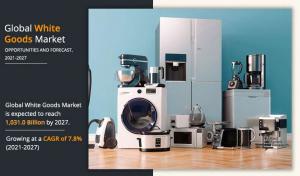White Goods Market Size is Projected to Exceed $1 Trillion by 2027 (7.8% CAGR)
White goods market size was valued at $ 635.4 billion in 2019, is estimated to reach $ 1,031.0 billion by 2027, registering a CAGR of 7.8% from 2021 to 2027.
Request Sample Copy of Report: https://www.alliedmarketresearch.com/request-sample/6923
Rise in disposable income, growth in advertisement and internet penetration, and surge in the number of restaurants and hotels fuel the growth of the global white goods market. On the other hand, usage of white goods affects the environment and promotes health issues, which impedes the growth of the market. However, launch of new eco-friendly products and further technological advancements are expected to present number of opportunities in the near future.
Global warming and emission of the greenhouse gasses are considered to be the major challenge for the growth of the AC market during the forecast period 2021-2027. Chlorofluorocarbons (CFCs) is the greenhouse gas, which is responsible for depletion of the ozone layer and this gas is significantly emitted though the refrigerators and air conditioners.
Technological up gradation in white goods is majorly attracting consumers to buy and replace their old home appliances. Many white goods manufactures are upgrading white goods to stand apart from their competitors. Now air conditioners are available with inverter and air purification technologies, which is further anticipated to positively influence the global air conditioners market throughout the forecast period.
The global white goods market exhibits high growth potential in the developing economies such as India and China, owing to increase in personal disposable income and high spending for improving high standard of living. People are actively replacing old appliances with smart and highly technological household commercial white goods including air conditioners, refrigerators, microwave ovens, water heaters and vacuum cleaners. Now a days, white goods manufacturers are making more advanced and smart featured home and commercial appliances, which can be connected to the internet. In addition most of the white goods can be controlled and regulated with smartphones, which is expected to attract consumers and create huge demand during the forecast period 2021-2027.
Growing commercial & government complexes in various end-user industries of the white goods such as hotels & restaurants, food outlets, hospitals & clinics, and cleaning agencies are creating huge demand for air conditioners, washing machines, microwave oven and vacuum cleaners. Dishwasher segment has been growing at the fastest CAGR growth rate as dishwasher manufactures are making these dishwashers available in customized form. People are actively taking interest in the improvement of home and kitchens with smart home appliances, which is further adding to the growth of the white goods market during the forecast period.
LIMITED-TIME OFFER - Buy Now & Get Exclusive Discount on this Report: https://www.alliedmarketresearch.com/checkout-final/7d07f50a7154736689c7108e0973d5d8
Based on end user, the residential segment held largest market share with nearly three-fifths of the global white goods market in 2019, and is anticipated to maintain its dominance till 2027. Growing disposable income and increase in spending on home improvement drive the growth of the segment. At the same time, the commercial segment would showcase the fastest CAGR of 8.5% during the forecast period. Rise inhotel & restaurants, hospital & clinics, commercial complexes and government offices drive the growth of the segment.
Based on product, the refrigerator segment accounted for nearly two-fifths of the global white goods market share in 2019, and is projected to lead the trail by 2027. Growing investments in innovation of refrigerators units and rising income levels coupled with reduced product prices with high specifications availability drive the growth of the segment. On the other hand, the dishwasher segment is expected to portray the fastest CAGR of 10.3% throughout the forecast period. The rising number of working population and nuclear families is fueling product demand. Also, the growing adoption of the product in both residential and commercial sectors to save the time, water, and energy for utensils cleaning further drives the growth of the segment.
Based on region, Asia-Pacific, followed by North America held the major share in 2019, generating nearly half of the global market. The growing standard of living, rise in disposable income and high spending on the home improvement such as interior designing fuel the growth of the market. The LAMEA region would also showcase the fastest CAGR of 9.4% from 2021 to 2027. Rapid growth of the retail sector and business expansions of the major white goods manufactures in the region drive the growth of the market.
The players operating in the white goods industry have adopted product launch and business expansion as their key developmental strategies to expand their market share, increase profitability, and remain competitive in the market. The key players profiled in this report include Alliance Laundry System LLC, AB Electrolux, Blue Star Limited, Haier Group Corporation, IFB Industries Ltd, LG Electronics Inc., Havells India Limited, Koninklijke Philips N.V., The Middle by Corporation and Whirlpool Corporation.
Small Gas Engine Market to Reach $4 Billion by 2030, Fueled by Construction & Lawn Equipment Demand
Video Laryngoscope Market Poised for Growth Amid Rising Demand for Minimally Invasive and Technologically
Dried Spices Market Size and Share Analysis, Growth Trends & Forecasts (2023-2032)
Więcej ważnych informacji
 Jedynka Newserii
Jedynka Newserii

 Jedynka Newserii
Jedynka Newserii

Konsument

Proces deregulacji nie dotyczy branży tytoniowej. Jest propozycja kolejnej ustawy w ciągu kilku miesięcy
Najpierw wprowadzenie podatku akcyzowego na saszetki nikotynowe, potem propozycja przepisów, które zmierzają do wycofania tych produktów z rynku – przedstawiciele środowisk biznesowych podkreślają, że przygotowywane przez resort zdrowia przepisy wprowadzają chaos legislacyjny w branży tytoniowej. To tym bardziej dziwi przedsiębiorców, że stoi w opozycji do prowadzonego przez rząd procesu deregulacji w gospodarce. W dodatku może mieć negatywne skutki dla budżetu państwa i doprowadzić do skokowego wzrostu szarej strefy.
Bankowość
Grzyby rozkładające tekstylia nagrodzone w konkursie ING. 1 mln zł trafi na innowacyjne projekty dla zrównoważonych miast

Firma Myco Renew, która opracowała technologię rozkładającą tekstylia za pomocą grzybów, została laureatem siódmej edycji Programu Grantowego ING. Motywem przewodnim konkursu skierowanego do start-upów i młodych naukowców był tym razem zrównoważony rozwój miast i społeczności. Łącznie na nagrodzone innowacyjne projekty trafił 1 mln zł. Wśród nich są także bezzałogowe statki powietrzne dostarczające defibrylatory czy system do zbierania deszczówki w blokach.
Prawo
Trwają próby wzmocnienia dialogu społecznego. Niespokojne czasy wymuszają większe zaangażowanie społeczeństwa w podejmowanie decyzji

Według zapowiedzi szefowej Komisji Europejskiej Ursuli von der Leyen głos partnerów społecznych i dialog społeczny będą stały w centrum procesu decyzyjnego w Europie. Taki jest cel podpisanego w marcu Paktu na rzecz europejskiego dialogu społecznego. Potrzeba wzmocnienia głosu społeczeństwa jest również podkreślana na forum krajowym. Rząd planuje reformę Rady Dialogu Społecznego, by usprawnić pracę tej instytucji, a przedsiębiorcy wzywają do rzetelnego konsultowania ze stroną społeczną ustaw, które wychodzą z rządu.
Partner serwisu
Szkolenia

Akademia Newserii
Akademia Newserii to projekt, w ramach którego najlepsi polscy dziennikarze biznesowi, giełdowi oraz lifestylowi, a także szkoleniowcy z wieloletnim doświadczeniem dzielą się swoją wiedzą nt. pracy z mediami.








.gif)

 |
| |
| |
|